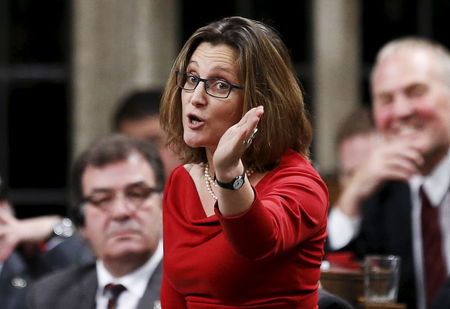Since the election of Geoff Regan to the position of Speaker at the start of the new parliament, there has been a renewed conversation around heckling in the House of Commons. The problem with that discussion is the tone of sanctimony that has pervaded it, and the hypocritical pearl clutching by MPs who insist that they hate it and never heckle, except that they do. While there is an expectation that it's up to the Speaker to lay down the law and put heckling MPs in their place, it seems pretty obvious to me that there needs to be bottom-up changes in the way that things work in the Commons rather than this top-down approach of the schoolmaster admonishing his unruly pupils.
Let me first say that I'm not opposed to some level of heckling in the chamber. Obviously sexist and boorish commentary should be called out and dealt with, but I have to say, as someone who has attended virtually every QP for the last eight years, that I find the crosstalk during QP to be extremely informative particularly during the era of ministers who read out bland talking points rather than answering questions, or who would respond with misleading pabulum. Heckling was also useful for knocking some ministers off of their talking points, which can be a valuable exercise for MPs who are trying to hold a government to account. If ministers can't answer of their own accord, there's a problem.
The other factor to consider is to be more observant of when the general level of din in the chamber rises, and oftentimes it has to do with what is being said at the time, and how it's delivered. Is the MP reading out an insult in their scripted question? The noise level responds. Is the minister or parliamentary secretary not answering? Or are they pulling an Alice Wong or Leona Aglukkaq, reading lines like "We will take no lessons from the Liberals…" in their talking points? Of course you're going to get more of a response. It's insulting to the intelligence of MPs (and Canadians), and, shockingly, MPs don't like being insulted in such a cavalier fashion.
I would also add that in the past few weeks, the level of din in the Commons has been substantially reduced, and anyone who thinks that the level of volume or heckling is anything approaching what has gone on in the last four years, well, they're both mistaken and they likely haven't actually attended QP. If you're going by the general background noise from those ten-second clips you see on the news then you're in fact being misled those clips are chosen for their drama and point-scoring, which are the very moments that other MPs are going to be their most boisterous. Question Period is theatre, and that's what you're seeing on your screens, not the broader sense of what is going on.
So how do we change the behaviour if not relying on the Speaker to crack the whip? Mostly it's going to involve changing the culture of the way things operate in the Commons, and I'm not just talking about MPs having more respect for one another. Rather, it has to do with the way MPs are doing their jobs in the chamber, and right now, the way the rules are structured give the perfect conditions for MPs to want to heckle. Why? Because the ability to participate in a meaningful way has been stripped from them. Between speaking lists and scripts, an MP who isn't participating has nothing better to do at their desks than signing a stack of documents or Christmas cards, and they're bored and disengaged. That breeds the kind of unrest that makes it perfect for them to want to heckle as a means of participation.
Getting MPs engaged in the debates means changing up some of the rules. For starters, we need to get rid of the speaking list where the House Leaders decide who will be up to speak, rather than let the Speaker decide. If there's no list, then MPs will have to stand to catch the Speaker's attention if they want to ask a question. It means they're going to have to be ready, and that means getting engaged in what's going on. We saw the odd example of this in the last parliament, where every now and again the speaking list would be exhausted and there being a few minutes left on the clock, and MPs did stand up to ask additional questions. We just need to return this practice to the whole 45 minutes. I would be open to at least keeping the party rotation in place for the sake of fairness, but the list, whether submitted or internal to the party, needs to go.
The other change that needs to happen is that scripts need to be outlawed. In 1956, the Speaker's ruled that MPs can only refer to notes and not prepared texts outside of maiden speeches, the budget, or the reply to the Speech from the Throne that's it. And we need to get back to that system, because there is no free-flow of debate. If everyone has prepared lines, nobody is actually engaging in what is being said on either side, particularly when opposition MPs ask the question on the paper in front of them no matter the response they get. Force MPs to pay attention to their questions and answers, so that they can have actual follow-ups.
I will note that in the current parliament, we're seeing the majority of ministers and parliamentary secretaries answering without scripts, and that's great. But this needs to happen for all MPs. And if you keep them engaged, I'll bet that the actual misbehaviour will fall away, and any heckling and crosstalk will be participatory as opposed to disruptive. Changing the culture is possible MPs just need to want to do it rather than blame the Speaker.






